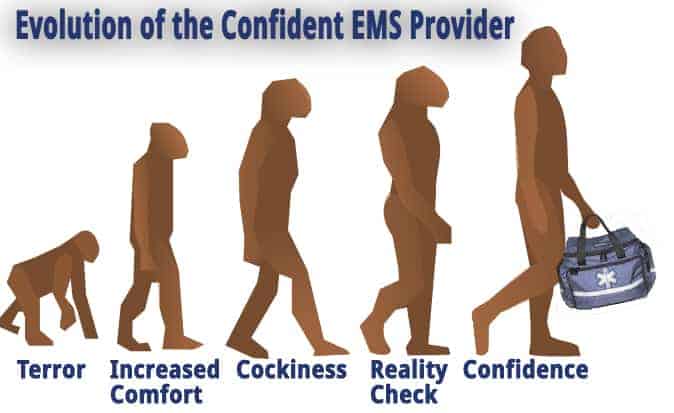By Dan Limmer
While teaching at ClinCon 2015 in Orlando, Florida I had the good fortune to speak to some very nice EMS educators and practitioners. Two of my presentations dealt with confidence. While we lose people in EMS for many reasons (low pay, long hours, tough calls), I believe one of the major and frequently overlooked reasons is that people never get confident in their ability to handle calls. They don’t believe they can do the job.
This post from 2011 is as valid today as it was then. Enjoy!
I had a colonoscopy this week. Don’t worry. No life-changing revelations at the hands of the gastroenterologist (yes, slight pun there)–and no details. But any time a person who has a medical background undergoes any type of procedure or hospitalization it certainly is fodder for conversation.
I was checked into the hospital for the procedure and moved to and from several different areas. My wife thought it was much like Disney World where you never really feel you have been waiting in the same line for long. Everyone was nice.
When I got into the area where I donned the gown and got the IV was when I made my first medical observation: while incredibly nice, the nurse assigned to me wasn’t confident.
I could tell this by several things:
- she seemed to be reciting from a script
- she didn’t put the tourniquet on tight enough to make a vein stand up
- she couldn’t locate (more accurately, choose) a vein
There is a difference between lack of confidence and other personal issues. This nurse was fully invested, kind, and trying very hard. She wanted to do the job. I just don’t think she believed she could do the job at the level she wanted to.
It doesn’t matter to me that she missed the first IV attempt. That happens to everyone. It was that I don’t think SHE believed she could actually hit the vein. I don’t say this judgmentally. I actually know this from experience.
As a new medic many years ago I started out hitting veins very reliably. Then my confidence was shaken. It took a while to get it back. In the time it took me to get my angio mojo back, my IV efforts looked quite a bit like hers.
One of the best ways to tell a person isn’t confident is to see if the person will make decisions.
People who lack confidence won’t–or will take a long time. I once worked with a medic who was faced with an elderly woman with a pulse in the 30s. He rationalized it away as “not that bad, maybe she is in good cardiovascular health.” I don’t think he believed that. I think he was worried that if he started an IV he’d be forced with a medication choice or a call for orders he believed he couldn’t do.
People who lack confidence won’t make “entry level” decisions for fear of having to leave their comfort zone and make additional, more difficult decisions.
Confidence is difficult to define–and in observation can be very difficult to discern from cockiness. Here is my definition of each:
Confidence is knowing you can handle most of what a call will throw at you and the knowledge of when to call for help when you need to.
Cockiness is falsely believing you know everything.
People move through stages as they mature as providers at any level. If I were to create a continuum or a series of stages (much like our oft-memorized stages of death and dying) for how EMS providers develop confidence it would go like this:
I haven’t come up with a catchy mnemonic, but I think you get my point.
Take-home points
- We don’t begin as a confident provider. We work at it. We work hard. It takes time.
- Confidence is acquired in many ways but most who have gained confidence can point to one or two mentors who were instrumental in the quest.
- Confidence can wane with time away from EMS or an unusual call that tests you. Never give up.
- Once you have gained and lost confidence it is much easier to get back than to acquire originally.
Where are you on the confidence scale?




I like this quite a bit. You embraced this concept well with a good illustration of your important point.
I tell newbies that one’s confidence in EMS is like a sine wave. One day they feel like they know what they’re doing, then something happens and they feel like they don’t know anything. Then the cycle repeats.
After 16 years I just assume that I don’t know anything and that helps my confidence greatly because I’m never surprised when I’m wrong.
Chris–thank you for posting. You make great points. I have had ups and downs in my time. If I have been out for a bit or start in a new place it seems I have to get it back again.
I think we lose people in EMS because they never become confident. I also believe I am here today because some amazing people helped me develop confidence.
This is me right now. While everyone else is saying “I’m the shit, look at me.” I 2nd guess.
What if when you finally become confident and then someone tears you down, but does teach you anything.
Doesn’t
Hello Wayward–(hopefully not too wayward because of this…)
This experience isn’t the first and probably won’t be the last time this will happen in EMS. There are a lot of egos and personalities in the EMS biz. There is also a certain amount of competition and even popularity contests. Mix that with some stress and it isn’t always pretty.
The road to confidence isn’t a straight line. There are ups and downs on the way. Confidence also has different levels. Since you said you “finally” became confident, think it is expected to have your confidence challenged a from time to time. Shake it off and go out and do good things again. Learn from the negative exchange (including how to avoid them) and get back in the saddle.
People can’t take away your confidence. Only you can do that. Don’t let ’em get you down!
I’ve noticed this too. I’ve seen so many EMT and Medics with the “I’m better than you (civillan) becayse I can save lives, and I’m better than you (at other EMTs) it is almost they have the “I’m the shit, I’m awesome, I’ve done this and this, I have had training in this and this” Then you have the humble EMTs and Paramedics, who you know are good and they know it, but they don’t flaunt it. You hear it from others and watch them. They know they are good but they keep their Egos in check. When did this becoming a pissing contest?
I’ve been in an ALS precepting program at work for over a year now. I can run most calls with confidence and competence. Critical calls are my Achilles heel. My preceptor has found that I lock up on critical calls or I’ll be going in the right direction of treatment and then I get to a point where my mind starts spinning. At that point I lock up. Strange that I can run 95% of calls with no issues, but the 5% that I need to be on my game I faulted. Any one have any thoughts? Thank you.
Terror. Definitely the terror stage as I leave cardiology and ACLS behind and move into PALS and OBGYN.
It feels like the more I learn, the less confident I feel, hence googling “how to be confident as a new paramedic” at 0200.
Yeah….terror.